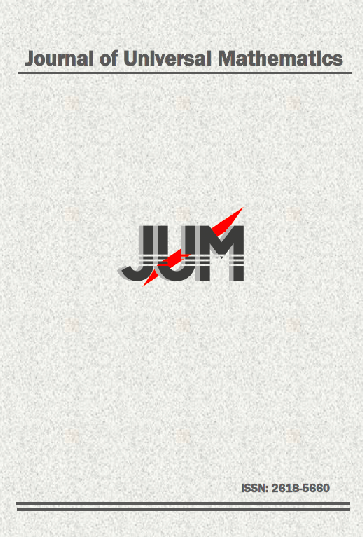IN THE MULTIPLAYER PRISONER'S DILEMMA, A PLAYER EMPLOYING A ZERO-DETERMINANT STRATEGY SECURES ADVANTAGEOUS OUTCOMES FOR THE ENTIRE GROUP.
IN THE MULTIPLAYER PRISONER'S DILEMMA, A PLAYER EMPLOYING A ZERO-DETERMINANT STRATEGY SECURES ADVANTAGEOUS OUTCOMES FOR THE ENTIRE GROUP.
When there is an interaction between the level of choice of an individual and a group, there is no favorite but to refer to the problem of a multi-member prisoner's dilemma game. Also in real life, there is a widespread need for cooperation or defection amongst a group of population in the matter of choice. The problem of multiplayer prisoner's dilemma is widely used in real life. We conducted this study to find out how people cooperate in a multiplayer interaction in the prisoner's dilemma game. In this study, we examine the interaction between an individual and a group of population and look for the Zero-Determinant strategies in the case of multiplayer prisoner's dilemma game.
Keywords:
Interaction, Cooperation, Evolution of Cooperation Multi-player Prisoner, Zero-Determinant Strategies.,
___
- E. Akin, Stable cooperative solutions for the iterated prisoner’s dilemma, arXiv preprint arXiv:1211.0969 (2012).
- E. Akin, The iterated prisoner’s dilemma: good strategies and their dynamics, Ergodic Theory, Advances in Dynamical Systems, pp.77-107 (2016).
- R. Axelrod, WD. Hamilton, The evolution of cooperation, science, vol.211, N.4489, pp.1390-1396 (1981).
- R. Boyd, PJ. Richerson. The evolution of reciprocity in sizable groups, Journal of theoretical Biology, Vol.132, No.3, pp.337-356 (1988).
- A.K. Dixit, S. Susan, Games of strategy: Fourth international student edition. WW Norton & Company, (2015).
- C.S. Gokhale, A. Traulsen, Evolutionary games in the multiverse. Proceedings of the National Academy of Sciences, Vol.107, No.12, pp.5500-5504 (2010).
- G. Hardin, The tragedy of the commons, In Thinking About the Environment, pp.173-178, Routledge (2015).
- R. Hardin, Collective action, RFF Press (2015).
- C. Hauert, HG. Schuster, Effects of increasing the number of players and memory size in the iterated Prisoner’s Dilemma: a numerical approach, Proceedings of the Royal Society of London. Series B: Biological Sciences, Vol.264, No.1381, pp.513-519 (1997).
- C. Hilbe, B. Wu, A. Traulsen, MA. Nowak, Cooperation and control in multiplayer social dilemmas, Proceedings of the National Academy of Sciences, Vol.111, No.46, pp.16425-16430 (2014).
- C. Hilbe, A. Traulsen, T. R¨ohl, M. Milinski, Democratic decisions establish stable authorities that overcome the paradox of second-order punishment. Proceedings of the National Academy of Sciences, Vol.111, No.2, pp.752-756 (2014).
- C. Hilbe, MA. Nowak, A. Traulsen, Adaptive dynamics of extortion and compliance. PloS one, Vol.8, No.11, p.e77886, (2013).
- C. Hilbe, MA. Nowak, K. Sigmund, Evolution of extortion in iterated prisoner’s dilemma games. Proceedings of the National Academy of Sciences, Vol.110, No.17, pp.6913-6918 (2013).
- C. Hilbe, A. Traulsen, K. Sigmund, Partners or rivals? Strategies for the iterated prisoner’s dilemma. Games and economic behavior, Vol.92, pp.41-52 (2015).
- L.A. Imhof, MA. Nowak, Evolutionary game dynamics in a Wright-Fisher process, Journal of mathematical biology, Vol.52, pp.667-681 (2006).
- M. Kimura, The neutral theory of molecular evolution, Cambridge University Press, (1983).
- R.D. Luce, H. Raiffa, Games and decisions: Introduction and critical survey, Courier Corporation, (1989).
- M. Olson Jr, The Logic of Collective Action: Public Goods and the Theory of Groups, with a new preface and appendix, Vol. 124. Harvard University Press, (1971).
- J. Von Neumann, O. Morgenstern, Theory of games and economic behavior. In Theory of games and economic behavior. Princeton university press, (2007).
- J.F. Nas, Non-cooperative games. Annals of mathematics, Vol.54, No.2, pp.286-295, (1951).
- M.A. Nowak, Evolutionary dynamics: exploring the equations of life. Harvard university press (2006).
- M.A. Nowak, K. Sigmund, Evolutionary dynamics of biological games. science, Vol.303, No.5659, pp.793-799 (2004).
- M.A. Nowak, Five rules for the evolution of cooperation. science, Vol.314, No.5805, pp.1560-1563 (2006).
- M.A. Nowak, K. Sigmund, Evolution of indirect reciprocity, Nature, Vol.437, No.7063, pp.1291-1298, (2005).
- M. Nowak, K. Sigmund, A strategy of win-stay, lose-shift that outperforms tit-for-tat in the Prisoner’s Dilemma game. Nature, Vol.364, pp.56-58, (1993).
- E. Ostrom, Analyzing collective action. Agricultural economics, Vol.41, pp.155-166, (2010).
- E. Ostrom, Governing the commons: The evolution of institutions for collective action. Cambridge university press (1990).
- W. Poundstone, Prisoner’s dilemma: John von Neumann, game theory, and the puzzle of the bomb. Anchor, (1993).
- W.H. Press, FJ. Dyson, Iterated Prisoner’s Dilemma contains strategies that dominate any evolutionary opponent. Proceedings of the National Academy of Sciences, Vol.109, No.26, pp.10409-10413, (2012).
- L. Pan, D. Hao, Z. Rong, T. Zhou, Zero-determinant strategies in iterated public goods game. Scientific reports, Vol.5, No.1, pp.1-10, (2015).
- H. Russell, Collective action, RFF press, Vol.150, pp.2000, (1982).
- K. Sigmund, The calculus of selfishness, In The calculus of selfishness, Princeton University Press, (2010).
- J.M. Smith, GR. Price, The logic of animal conflict. Nature, Vol.246, No.5427, pp.15-18 (1973).
- AJ. Stewart, JB. Plotkin, From extortion to generosity, evolution in the iterated prisoner’s dilemma. Proceedings of the National Academy of Sciences, Vol.110, No.38, pp.15348-15353, (2013).
- C. Taylor, D. Fudenberg, A. Sasaki, MA. Nowak, Evolutionary game dynamics in finite populations. Bulletin of mathematical biology, Vol.66, pp.1621-1644, (2004).
- A. Traulsen, JM. Pacheco, MA. Nowak, Pairwise comparison and selection temperature in evolutionary game dynamics. Journal of theoretical biology, Vol.246, No.3, pp.522-529, (2007).
- A. Traulsen, JC. Claussen, C. Hauert, , Coevolutionary dynamics: from finite to infinite populations. Physical review letters, Vol.95, No.23, pp.238701, (2005).
- B. Wu, PM. Altrock, L. Wang, A. Traulsen, Universality of weak selection. Physical Review E, Vol.82, No.4, pp.046106, (2010).
- T. Yamagishi, KS.Cook, Generalized exchange and social dilemmas. Social psychology quarterly, pp.235-248, (1993).
- ISSN: 2618-5660
- Başlangıç: 2018
- Yayıncı: Gökhan ÇUVALCIOĞLU
Sayıdaki Diğer Makaleler
ON THE GROUP OF POINTWISE INNER AUTOMORPHISMS
TWO POINT FUZZY BOUNDARY VALUE PROBLEM WITH EXTENSION PRINCIPLE USING HEAVISIDE FUNCTION
Mohammad Irshad KHODABOCUS, Noor-ul-hacq SOOKIA, Radhakhrishna Dinesh SOMANAH
THE FIRST ISOMORPHISM THEOREM FOR (CO-ORDERED) $\Gamma$-SEMIGROUPS WITH APARTNESS
Ahmad Ali MEHRAD, Serkan Ali DÜZCE
Miailou NAPO, Mohamado KIEMA, Issa ZABSONRE
